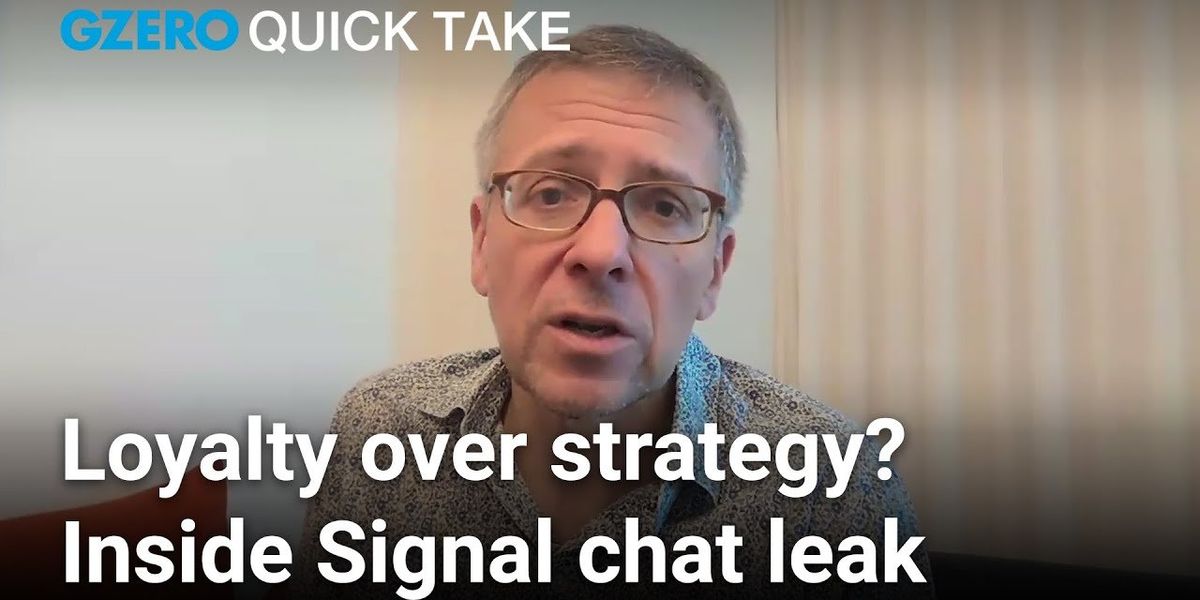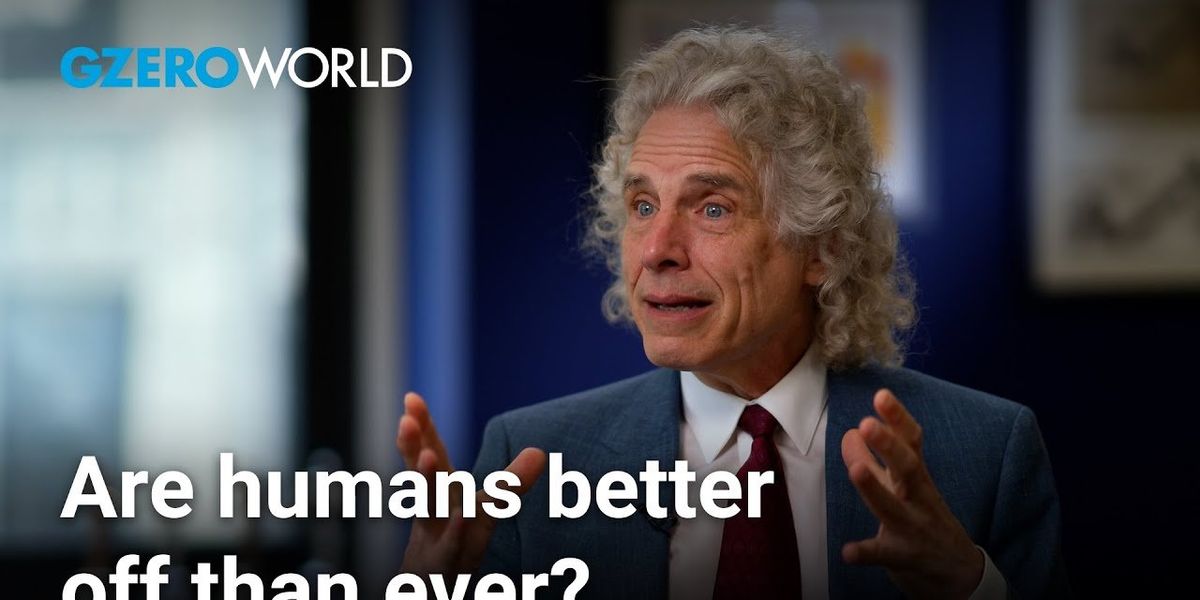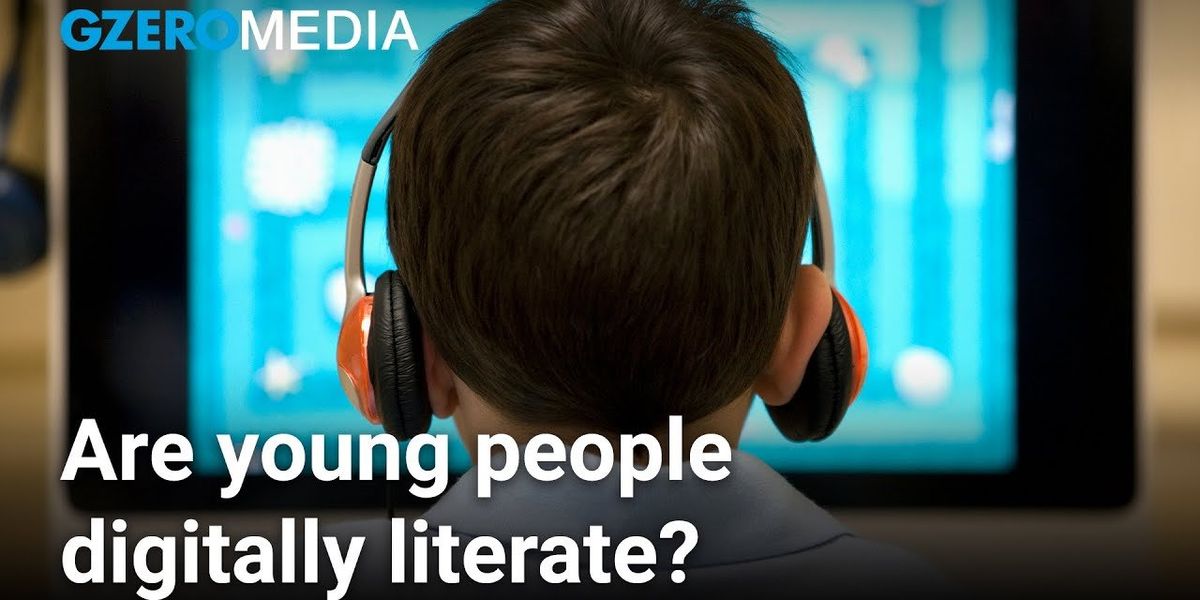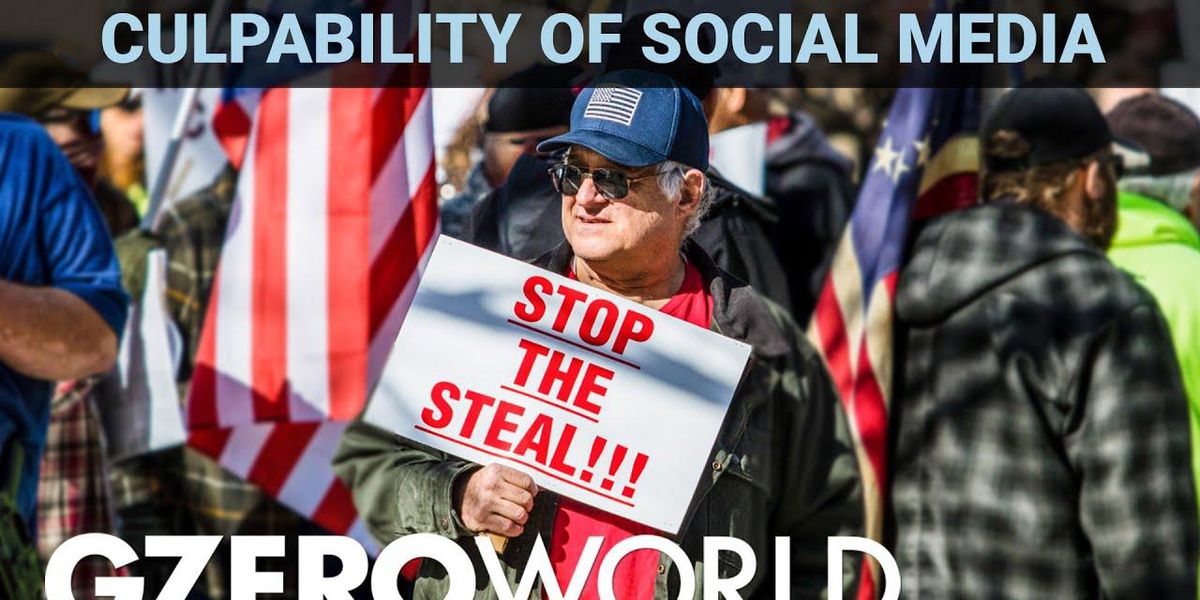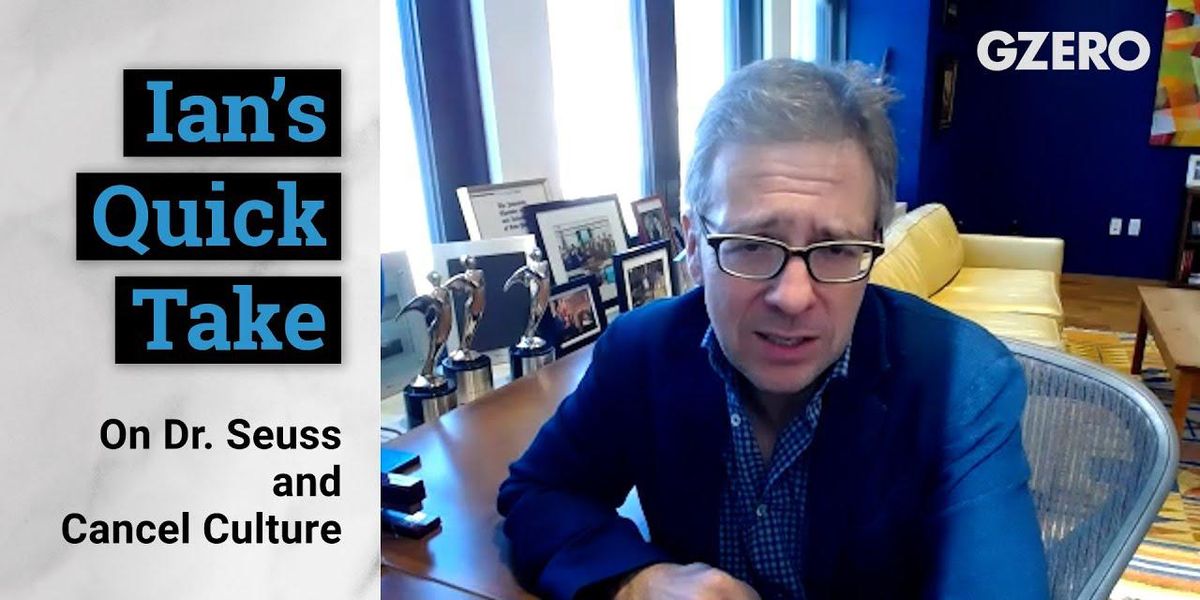Trending Now
We have updated our Privacy Policy and Terms of Use for Eurasia Group and its affiliates, including GZERO Media, to clarify the types of data we collect, how we collect it, how we use data and with whom we share data. By using our website you consent to our Terms and Conditions and Privacy Policy, including the transfer of your personal data to the United States from your country of residence, and our use of cookies described in our Cookie Policy.
{{ subpage.title }}
Leaked Signal chat shows Trump team's mindset
Ian Bremmer's Quick Take: A Quick Take on the back of the full transcript of these Signal chat that's going on about the bombing of the Houthis. A few things here. First of all, are we surprised that a journalist is actually publishing what is clearly classified data? And there's no question, it's classified data. I mean, you're talking about the targets, the exact timing in advance of US military strikes, incredibly sensitive information, against people that are described as terrorists in the chat. And clearly, if that information had gotten out in advance when Jeffrey Goldberg had received it in real time, it would have put the operation at risk. It would have prevented it from going on. It would have been denounced as leaking classified information, and he would be facing some legal charges from the administration. So I don't think it's credible to say that this is not classified.
But since Trump and members of administration have now said that it isn't classified, there was nothing classified in it, I guess that provides legal cover since it is ultimately in the charge of the president to be able to determine, as president, whether or not something is classified. That there's nothing illegal in Goldberg and the Atlantic Magazine now taking all of that information and putting it out to the public. So is that embarrassing for the US with its allies in terms of how they're handling such a chat? The answer is of course, yes. And I expect that we're going to see a significant amount of continued focus on this topic. A lot of people are going to be asking questions about how it was that this conversation could have been had on Signal and also how it was that Goldberg could have been brought on board. But say that as it may. I mean if you are the Trump administration here, it is age-old tactic, full denial responsibility is actually of your political adversaries so blame Goldberg. Imply that maybe he tried to get on the call through nefarious ways.
It's all his fault. It's overstated. He's a fake news, no news journalist. No one should pay attention to him. He's a bad guy. I mean all of that stuff. And I was particularly bemused by Elon Musk sharing a post from the Babylon Bee saying that, "If you wanted to ensure that nobody ever saw information you'd put it on page 2 of the Atlantic." And of course, that is true for Elon, and it's true for Trump supporters. And this is why the strategy works, is because the Atlantic and the people that read the Atlantic and support the Atlantic are all considered disinformation by those that are loyal to Trump. And vice versa. Fox, and Newsmax and all of the right-wing podcasts. Those are considered fake news by people that don't support, that dislike Trump. And that allows a strategy of full denial, not engaging with the facts and blaming those that are coming after you to be successful. Now, I still think that there are interesting pieces of information here.
Perhaps the most important is that the actual policy conversation, not the details of the war fighting itself, but rather whether or not it was a good idea to be attacking the Houthis, in a big way that was potentially going to increase energy prices. And that was much less of a fight of the Americans than it would be of those in the region that are engaged in the direct proxy war with Iran or the Europeans who have a lot more directly at stake, in terms of their trade in transit. And that was a very reasonable question, and it was strongly, in other words, Vice President Vance opposed these strikes and he's the most important person. He's the most senior ranking person in this chat. Trump isn't on the chat. And he's not saying the president is wrong. He's saying, "I don't believe the president is fully informed and this clearly is not in his interest, in his policy interest."
Now, the reason this is important is because in Trump's first term, I think you would have had a very similar conversation from people like Mike Pence and Mike Pompeo and others that would have been on this chat, but then they would have brought it to the president. And many, many instances in the first term of policy disagreements that then came up and said, "Mr. President. Respectfully, we think we've got additional information and we can better carry out your will by doing X, Y, and Z." And there were checks. There were internal checks on executive authority. What we see this time around is we see JD Vance, who's obviously a very smart guy saying, "I think this is a really bad idea. We shouldn't be doing it, but I'm prepared not to raise it to the president unless I have everybody around me supporting me because I can't do this by myself. I'm just going to get my head chopped off." And there's a little bit of back and forth.
And Stephen Miller, the deputy chief of staff for policy in the White House and a full-on Trump loyalist, says, "Nope, the president wants this. I'm ending the conversation." And that's the end of the conversation, and it never gets to Trump. And then they go ahead and they bomb. So whatever you think about whether this was a good or a bad decision, the challenge here is that we have a big cabinet, some of whom are very capable, some of whom are absolutely not capable. But first and foremost is not getting the best information to the president because he's extremely confident. He believes that his policies are always the right ones, and he is absolutely punishing anything that feels like disloyalty, inside or outside of his team. That's why Pompeo, for example, John Bolton, have had their security details stripped away. Even though the Iranian government has been trying to assassinate them, right? Why? Because they were disloyal to Trump. That's not why they're trying to assassinate him. That's why Trump took away their security detail and that is a very strong message to everybody that is on this chat.
And I do worry, I worry that the three most powerful men in power today around the world, all in their 70s, Trump, Putin, and Xi Jinping, are also men that are incredibly confident about the rightness of their views. That loyalty is the key to the most important currency of power that exists inside those systems. And increasingly, they're not getting good information from their own advisers. That's a dangerous place for the world to be. It's a dangerous place for the world to be heading, and that's frankly the most important thing that I took out of this chat. So that's it for me. I'll talk to you all real soon, thanks.
- US strikes Houthi strongholds, seeks to keep shipping lanes open ›
- What Trump team's war plans leak revealed - GZERO Media ›
- Signal failure: Trump team includes journalist in top secret plans ›
- In wake of the Signal scandal: Deflected blame and Transatlantic tensions ›
- Turkey's protests & crackdowns complicate EU relations - GZERO Media ›
Steven Pinker shares his "relentless optimism" about human progress
If you follow the news closely, chances are your view of the state of the world is not super optimistic. From war in Ukraine to a warming planet to global poverty and hunger, there's plenty to get upset about. But what if things are actually getting...better? That's what Harvard psychologist Steven Pinker asks in his interview with Ian Bremmer for the latest episode of GZERO World.
"If you compare the number of wars and the number of people killed in wars in the sixties and the seventies and even the eighties, we're actually much better off today" Pinker argues. "And so if you don't look at data, if you look at headlines, since as long as bad things haven't vanished from the face of the earth, which they never will, you can get the impression that things are unchanged or even are worse than ever, even when they're improving. It's only when you count the number of wars, number of deaths in war, longevity, child mortality, extreme poverty, number of leisure hours, that you see that there actually has been improvement. "
Watch the GZERO World episode: Is life better than ever for the human race?
Catch GZERO World with Ian Bremmer every week at gzeromedia.com/gzeroworld and on US public television. Check local listings.
- Podcast: The case for global optimism with Steven Pinker ›
- Why is America punching below its weight on happiness? ›
- Is life better than ever for the human race? ›
- Why human beings are so easily fooled by AI, psychologist Steven Pinker explains ›
- Ian Explains: Will biotech breakthroughs lead to super humans? - GZERO Media ›
- Podcast: Tracking the rapid rise of human-enhancing biotech with Siddhartha Mukherjee - GZERO Media ›
- From CRISPR to cloning: The science of new humans - GZERO Media ›
- Yuval Noah Harari: AI is a “social weapon of mass destruction” to humanity - GZERO Media ›
- Yuval Noah Harari explains why the world isn't fair (but could be) - GZERO Media ›
- How medical technology will transform human life - Siddhartha Mukherjee - GZERO Media ›
Digital natives: Redefining youth digital literacy
Contrary to the common notion that today's young people are inherently digital-savvy due to their exposure to technology, chief innovation officer of USAID, Mohamed Abdel-Kader says that simply knowing how to navigate social media or use a smartphone does not equate to digital literacy. In a recent GZERO livestream presented by Visa, Abdel-Kader expressed how young people are not innately able to understand the broader implications of their digital actions, including being aware of the consequences of their online posts, critically evaluating information discovered, and navigating a digital world of “fake news.”
Education is the key, says Abdel-Kader. Digital education is essential to prepare the youth for the ever-evolving digital age, to equip the next generation to be active but responsible participants in the growing digital world.
To hear more about the challenges and opportunities that nation-states face when it comes to digitization, and how it could shape a more inclusive and resilient future, watch the full livestream here:
What Ukraine's digital revolution teaches the world
- What Ukraine's digital revolution teaches the world ›
- The Graphic Truth: Twitter doesn't rule the social world ›
- Exclusive GZERO/Maru Poll: With hate speech rising, Americans want a crackdown on social media ›
- Empowering small businesses in the digital age ›
- The weaknesses of a digital economy - GZERO Media ›
Be very scared of AI + social media in politics
Why is artificial intelligence a geopolitical risk?
It has the potential to disrupt the balance of power between nations. AI can be used to create new weapons, automate production, and increase surveillance capabilities, all of which can give certain countries an advantage over others. AI can also be used to manipulate public opinion and interfere in elections, which can destabilize governments and lead to conflict.
Your author did not write the above paragraph. An AI chatbot did. And the fact that the chatbot is so candid about the political mayhem it can unleash is quite troubling.
No wonder, then, that AI, powered by social media, is Eurasia Group’s No. 3 top risk for 2023. (Fun fact: The title, “Weapons of Mass Disruption,” was also generated in seconds by a ChatGPT bot.)
How big a threat to democracy is AI? Well, bots can't (yet) meddle in elections or peddle fake news to influence public opinion on their own. But authoritarians, populists, and opportunists can deploy AI to help do both of these things better and faster.
Philippine President Ferdinand Marcos Jr. relied heavily on his troll army on TikTok to win the votes of young Filipinos in the 2022 election. Automating the process with bots would allow him, or any politician with access to AI, to cast a wider net and leap into viral conversations almost immediately on a social platform that already runs on an AI-driven algorithm.
Another problem is deepfakes, videos of people whose faces or bodies are altered to make them appear as if they are someone else, typically intended for political disinformation (check out Jordan Peele's Obama). AI now makes them so well that they are very hard to spot. Indeed, DARPA — the same Pentagon agency that brought us the internet — is perfecting its own deepfakes in order to develop tech to help detect what’s real and what’s fake.
Still, the "smarter" AI gets at propagating lies on social media, and the more widespread its use by shameless politicians, the more dangerous AI becomes. By the time viral content is proven to be fake, it might already be too late.
Imagine, let's say, that supporters of Narendra Modi, India's Hindu nationalist PM, want to fire up the base by fanning sectarian flames. If AI can help them create a half-decent deepfake video of Muslims slaughtering a cow — a sacred animal for Hindus — that spreads fast enough, the anger might boil over before people check if the clip is real, if they even trust someone at all to independently verify it.
AI can also disrupt politics by getting bots to do stuff that only humans, however flawed, should. Indeed, automating the political decision-making process "can lead to biased outcomes and the potential for abuse of power," the bot explains.
That’s happening right now in China, an authoritarian state that dreams of dominating AI and is already using the tech in court. Once the robot judges are fully in sync with Beijing's Orwellian social credit system, it wouldn’t be a stretch for them to rule against people who've criticized Xi Jinping on social media.
So, what, if anything, can democratic governments do about this before AI ruins everything? The bot has some thoughts.
"Governments can protect democracy from artificial intelligence by regulating the use of AI, ensuring that it is used ethically and responsibly," it says. "This could include setting standards for data collection and usage, as well as ensuring that AI is not used to manipulate or influence public opinion."
Okay, but who should be doing the regulating, and how? For years, the UN has been working on a so-called digital Geneva Convention that would set global rules to govern cyberspace, including AI. But the talks have been bogged down by (surprise!) Russia, whose president, Vladimir Putin, warned way back in 2017 that the nation that leads in AI will rule the world.
Governments, the bot adds, “should also ensure that AI is transparent and accountable, and that its use is monitored and evaluated. Finally, [they] should ensure that AI is used to benefit society, rather than to undermine it."
The bot raises a fair point: AI can also do a lot of good for humanity. A good example is how machine learning can help make us live healthier and longer by detecting diseases earlier and improving certain surgeries.
But, as Eurasia Group's report underscores, "that's the thing with revolutionary technologies, from the printing press to nuclear fission and the internet — their power to drive human progress is matched by their ability to amplify humanity's most destructive tendencies."
- AI at the tipping point: danger to information, promise for creativity - GZERO Media ›
- Senator Mitt Romney on Tiktok: shut it down - GZERO Media ›
- Can the US stay ahead of China on AI? - GZERO Media ›
- Toxic social media & American divisiveness - GZERO Media ›
- Politics, trust & the media in the age of misinformation - GZERO Media ›
- Podcast: The past, present and future of political media - GZERO Media ›
- Can we trust AI to tell the truth? - GZERO Media ›
- Ian Bremmer: Algorithms are now shaping human beings' behavior - GZERO Media ›
- How AI can be used in public policy: Anne Witkowsky - GZERO Media ›
- AI's role in the Israel-Hamas war so far - GZERO Media ›
- UK AI Safety Summit brings government leaders and AI experts together - GZERO Media ›
- AI in the hands of evil masterminds - GZERO Media ›
- How is the world tackling AI, Davos' hottest topic? - GZERO Media ›
- This year's Davos is different because of the AI agenda, says Charter's Kevin Delaney - GZERO Media ›
- Podcast: Talking AI: Sociologist Zeynep Tufekci explains what's missing in the conversation - GZERO Media ›
- Why is TikTok being investigated by the EU over Romania's elections? - GZERO Media ›
Trump’s comeback tour
Donald Trump may have lost the 2020 election, but his greatest hits still draw a big crowd.
Watch more PUPPET REGIME!
Subscribe to GZERO Media's YouTube channel to get notifications when new videos are published.
- 2021: THE YEAR IN PUPPET REGIME - GZERO Media ›
- Trump's 2024 outlook: impact of Jan. 6 hearings ›
- Trump's 2024 outlook: more vulnerable after Jan 6 hearings - GZERO Media ›
- Totally eclipsed by Trump | PUPPET REGIME - GZERO Media ›
- Trump's moonshot to end the Ukraine war - GZERO Media ›
- Trump & Elon's grand plan to liberate you EVEN MORE - GZERO Media ›
- Putin's pep talk for Trump - GZERO Media ›
- No Nobel Peace Prize??? - GZERO Media ›
Social media’s responsibility in American politics
Former US Deputy National Security Adviser Ben Rhodes argues that one of the biggest issues in American political discourse at the moment is the lack of regulation on social media platforms. Americans believe fake news, not because they are all crazy, but because this information is being effectively presented to them as though it is fact. Biden should work with Big Tech to regulate social media, Rhodes tells Ian Bremmer on GZERO World, because the situation is worsening. "Part of what's different is the way in which social media and technology has literally made it possible for a very large chunk of this country to live in an alternative reality."
Watch the episode: Is American democracy in danger?
- Apple vs Facebook, a clash of the tech titans; social media ... ›
- Section 230: The 90's law still governing the internet - GZERO Media ›
- Kara Swisher on Big Tech's big problem - GZERO Media ›
- The Big Tech breakup: Could it happen? - GZERO Media ›
- GOP battle with Big Tech reaches the Supreme Court - GZERO Media ›
On Dr. Seuss and cancel culture
Ian Bremmer's Quick Take:
Hey everybody. Ian Bremmer here. Welcome to your week, life looking better every day in the United States, coronavirus land. But I thought I'd talk about, this week, all of this cancel culture that everyone's talking about right now. If you're on the wrong political side, your opponents are trying to shut you down and you take massive umbrage. I see this everywhere, and it's starting to annoy.
Last week, maybe, the biggest story was about Dr. Seuss and the fact that a few books were taken down, no longer being published by the Seuss Foundation, the publisher of those books, because of ethnic and racial stereotypes that were promoted in those books from decades and decades ago. Publishers in the private sector have the right to publish whatever they do and don't want that they have intellectual property control over. One thing that seemed silly on the back of it was all of these people then deciding to spend massive amounts of money, pushing Dr. Seuss to the top of the charts, for a whole bunch of books that were not getting canceled, that were still being published, money of which would be going to the same publisher that had decided to cancel the few books in the first place.
So very bizarre, and maybe makes everybody happy or everybody unhappy at the same time. But of course, the big story is that you had, then, this huge fodder for people on the left and right to come after each other. If you're on the left, of course, these books are horrible and need to be removed from the public dialogue. That of course also means that you're smearing Dr. Seuss as a whole, who, from many of our perspectives, were children's books that we grew up on and were just fine.
Then on the conservative side, you have people saying, "This is an outrage. Can you believe that they're trying to burn books and ban books? It's the beginning of authoritarianism and we're being canceled." Kevin McCarthy doing a reading of Green Eggs and Ham, which is perfectly fine, and you can still buy... A lot of people like to stand up and read perfectly innocuous Dr. Seuss books, but now there's strong politics behind it.
The problem is that any political issue, at a period of time that the United States is more politically divided, more politically dysfunctional, where political opponents are not just political opponents but are considered to be bad, fundamentally evil, means any issue that can be made into tribal warfare inside politics in the United States becomes precisely that. It drives people kind of batshit, right? We saw that with the Muppets, too. Those of you that know me know that I am a big fan of the Muppets, both as a show and puppets as a concept, so much so that it's like Hair Club For Men. I decided to become an owner.
Now, because done it back in the '70s, a lot of the skits that were done are now considered insensitive. So, Disney has decided to put a warning label on all of the Muppet shows from back then, warning of negative depictions and or mistreatment of people and cultures. To be fair, this is like the warning symbol that you see on your McDonald's apple pie that contents are indeed hot and could hurt you. It's because the United States is an incredibly litigious society and overly litigious society. This is corporate speak for, please don't sue us. We've done what we needed to do," but anybody that wants to watch the Muppets can still watch the Muppets.
It should not be a big deal, but of course you see Donald Trump Jr. coming out and saying, "They're banning the Muppets," and all of these other folks on the right saying, "How dare they. How can they possibly be banning the Muppets?" Which, of course, no one is actually doing. So, you see how we have a lot of folks' partisan ship on the right going crazy about cancel culture.
But what about on the left? Yeah, it's happening on the left, too. I saw this last week when Governor Abbott in Texas came out and said he's opening everything. So, 100% businesses are being open and no more mask mandate, which struck me as... I understand the business opening because there is an economic tradeoff between opening businesses and having quarantines, and when people are getting vaccinated, there's a much greater move in favor of economic openings. But saying you're ending the mask mandate is stupid and just playing politics. So, I was annoyed about that.
But then I saw people with millions of followers from the left on social media, like Michael Moore and Keith Olbermann, who were so angry with Abbott that they said, "This is Texas, and you see what they're like in Texas. If that's the way you feel well, then we shouldn't be sending Texas any vaccines." Who the hell is we? We're Americans. First of all, Texas is a diverse state that has both Democrats and Republicans. It's increasingly purple. It's not red or blue. Even if it was red, everybody needs vaccines. The entire country is rolling vaccines out and it's really important for us to do that in the US and do it around the world.
But there is such incredible dysfunction psychologically in this us versus them, bad versus good, black versus white, that you have partisans that have just lost their minds, that have lost their humanity in the spirit of being on the same team. The one that bothered me from the left the most in the last week was about CPAC. Some of you may have seen that when the CPAC Conference occurred down in Orlando, Florida at the Hyatt hotel, there was a stage and the design of the stage looked like, design-wise, a rune. They're not the swastika, but a rune that was worn by some Nazi officers.
Of course, everybody on the left goes crazy. Not everybody. A lot of people on the left go crazy, that it must've been intentional, this is a dog whistle for white nationalists and white supremacists. So, you have people with significant followings on the internet intranet saying that this is a Nazi support, and that you should be banning the GOP and banning Hyatt, which was hosting all of us. Alyssa Milano, with well over three million followers on Twitter, saying, "Hyatt is totally fine hosting Nazis. Boycott Hyatt."
Of course, anyone could understand that this was vastly overdone. This is conspiracy thinking that no one is doing research into figuring out what the actual stage looks like and this obscure rune from the Nazi-era Germany. Then we find out, we get the actual facts, which is it was a design, an event design company, that came up with the stage design for a fairly awkward space to do something that large. Company was called Design Foundry based in Maryland. Small company, 98%, more than 98%, of their political donations from their employees in the last year went to Democrats, not Republicans. They were the ones that came up with the design and they apologized.
The GOP said they're not going to use them for further events and all of that. Well, you would think on the back of that that, of course, Alyssa and others are going to take down their posts and they're going to say, "We got it wrong," and apologize. No, no. As of today, that post is still up there with thousands and thousands of retweets saying to boycott Hyatt, and Hyatt losing money on the back of this.
A small piece of advice if anyone sees this, post this out for Alyssa. Alyssa, do them a favor. Go stay at a Hyatt and take a post of yourself at the Hyatt and tell your fans the next time they're going to a hotel, they should stay at a Hyatt. Why? Because you caused economic damage out of political lunacy. It was completely wrong. It was completely without merit. They did nothing wrong. This is hurtful. It's hurtful to the country. It's hurtful to the corporation, but most importantly, it's hurtful to us. It's hurtful to the people who are no longer looking at each other as human beings, but instead as political sport, as scoring a point.
It doesn't matter if more of this is being done by one side or the other. What matters is that it's lunacy. It's fake news. It's not facts. It's conspiracy thinking. It's really going to cause much more damage to our polity, something that, I think, deeply, we all still want to believe in, and we want to make better.
So that is my little rant for today, for Monday, for kicking off the week. I hope everyone does well, and increasingly we aren't going to need to avoid people. Just a little bit longer. Looking forward to that. Take it easy. Be good.
Activists question Malaysia's clampdown on spoof sites
KUALA LUMPUR - The shutting down of parody Twitter accountBermanaTV has raised concerns among human rights groups in Malaysia, which claim that the suspension of parodical and satirical sites fits thealarming pattern of increased censorship and restrictions on freedom of expression by the Malaysian government.
